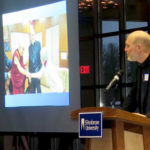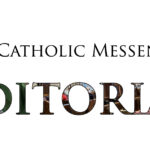By Corinne Winter
Many of us look forward to Oct. 31 as Halloween or All Hallow’s Eve. The neighborhood in which I live, for example, is fully alive with literally hundreds of children going house to house and many of us adults out in front of our homes passing out candy and enjoying all that young energy around us.
 Oct. 31 is also, however, known as “Reformation Day,” the anniversary of the day on which Martin Luther made a public statement that the church was in need of reform in a number of areas. This year has particular significance as the 500th anniversary of Luther’s action. Pope Francis and the U.S. Conference of Catholic Bishops have called us to use the occasion as a time to renew our commitment to dialogue and to the search for Christian unity.
Oct. 31 is also, however, known as “Reformation Day,” the anniversary of the day on which Martin Luther made a public statement that the church was in need of reform in a number of areas. This year has particular significance as the 500th anniversary of Luther’s action. Pope Francis and the U.S. Conference of Catholic Bishops have called us to use the occasion as a time to renew our commitment to dialogue and to the search for Christian unity.
The Ecumenical Movement was initiated by a group of Protestant leaders early in the last century. As the world was going to war over political issues, those leaders found it especially tragic that Christians, who were called by God to be one in Christ, were rather acting as instruments of division in the world, often engaging in arguments and in competition for membership that could even appear mean-spirited. Catholics soon began to join in the discussion, and the documents of Vatican II outline the Catholic Church’s official position on its importance, describing the restoration of Christian unity as one of its principal concerns (Unitatis Redintegratio, opening lines). Already during the time of the council, the Catholic bishops of the United States formed a commission to promote and lead the ecumenical work which continues to this day.
One of the key statements of the council is found in paragraph 8 of Lumen Gentium: “…many elements of truth and of sanctification are found outside [the Catholic Church’s] visible confines. Since these are gifts belonging to the church of Christ, they are forces impelling towards catholic unity.” This statement, especially when read together with the descriptions of the church as mystery and as sacrament, and in conjunction with Unitatis Redintegratio, the document on ecumenism, establishes the principle of mutually respectful dialogue as the way toward the unity we earnestly desire.
That dialogue received a great deal of attention among both clergy and laity in years immediately following the council. Many of us eagerly joined small groups for shared Scripture study and/or prayer (not including shared Eucharist) as well as social action. Perhaps hopes for full reunion were too high or the patience required for real dialogue was lacking among those of us who jumped in at that point, or perhaps we began to see the need to address divisions that existed, and seemed to widen among members of the Catholic Church itself; but I have not seen the same enthusiasm for ecumenism in recent decades.
However, the official work goes on, and the Magisterium continues to call our attention to its importance. Pope Francis, in his encyclical, the “Joy of the Gospel,” asserted that the witness of Christians in the world would be vastly strengthened if we could overcome the divisions among us. He insisted that in order to do that, we need to “walk together as pilgrims … {and} trust our fellow pilgrims.” Two years ago, the USCCB together with the Evangelical Lutheran Church in America published a “Declaration on the Way.” That document contains statements of agreement, explorations of continuing differences, and an outline of next steps to be taken in the on-going pursuit of full communion to which both Catholics and Lutherans believe that Christ calls us. The document is both optimistic and urgent in tone. The authors cite what has already been achieved, especially the 1999 agreed statement on Justification and its reception by a growing number of Christian communities. They also speak to the pain caused by our inability to worship together, a pain felt in a special way by families in which some are members of one denomination and some of another.
The contemporary ecumenical movement received its initial impetus from Christians who wished they could be a force for unity in the face of political issues leading to war. If we look at our current situation, on national and international levels, could our observations not stir us to the same desire? Both within and among nations, it seems that respectful dialogue has been replaced by a sometimes even mean-spirited need to prove oneself “right.” What if, in our approach to one another, Christians could become a model of cooperation and of respect for differences in approach even as we seek to explain our different positions more clearly? As we approach the anniversary of the Reformation, let us pray for one another with gratitude and renew our commitment to respectful, patient and open dialogue.
(Corinne Winter is a professor-emeritus of St. Ambrose University, Davenport.)











